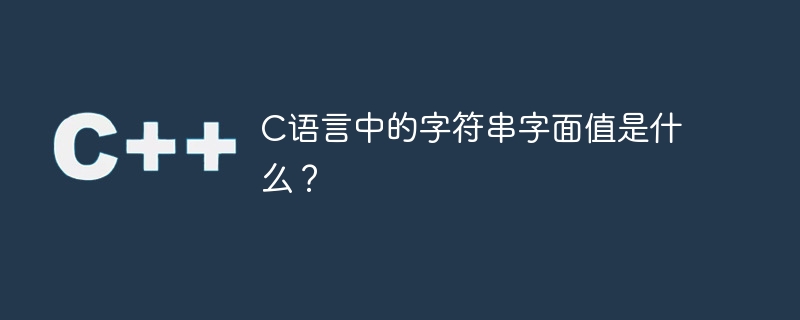

字符串文字是一个以零结尾的字符序列。例如,
Char * str = "hi, hello"; /* string literal */
字符串字面量用于初始化数组。
char a1[] = "xyz"; /* a1 is char[4] holding {'x','y','z','\0'} */
char a2[4] = "xyz"; /* same as a1 */
char a3[3] = "xyz"; /* a1 is char[3] holding {'x,'y','z'}, missing the '\0' */如果您尝试更改字符串文字的值,则它们是不可修改的,这会导致未定义的行为。
char* s = "welcome"; s[0] = 'W'; /* undefined behaviour */
始终尝试将字符串文字标记为常量,使用const。
char const* s1 = "welcome"; s1[0] = 'W'; /* compiler error! */
字符串文字也称为字符常量,支持不同的字符集。
/* normal string literal, of type char[] */ char* s1 = "abc"; /* UTF-8 string literal, of type char[] */ char* s3 = u8"abc"; /* 16-bit wide string literal, of type char16x[] */ char16x* s4 = u"abc"; /* 32-bit wide string literal, of type char32x[] */ char32x* s5 = U"abc";
Das obige ist der detaillierte Inhalt vonWas ist ein String-Literal in der C-Sprache?. Für weitere Informationen folgen Sie bitte anderen verwandten Artikeln auf der PHP chinesischen Website!
 Benennung von C-Sprachvariablen
Benennung von C-Sprachvariablen
 Selbststudium für Anfänger in C-Sprache ohne Grundkenntnisse
Selbststudium für Anfänger in C-Sprache ohne Grundkenntnisse
 Prioritätsreihenfolge der Operatoren in der Sprache C
Prioritätsreihenfolge der Operatoren in der Sprache C
 js-String in Array umwandeln
js-String in Array umwandeln
 Datenstruktur der C-Sprache
Datenstruktur der C-Sprache
 js-Methode zum Abfangen von Zeichenfolgen
js-Methode zum Abfangen von Zeichenfolgen
 Verwendung zufälliger Funktionen in der C-Sprache
Verwendung zufälliger Funktionen in der C-Sprache
 C-Sprachkonstantenverwendung
C-Sprachkonstantenverwendung




